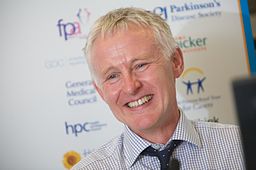Difference between revisions of "Norman Lamb"
Josh Leeson (talk | contribs) |
Josh Leeson (talk | contribs) (→Help from donors) |
||
| Line 22: | Line 22: | ||
Lamb said: 'All donations to my campaign are given by people who want to help me do my work in North Norfolk and nationally. It’s very costly to employ staff and communicate with people.' | Lamb said: 'All donations to my campaign are given by people who want to help me do my work in North Norfolk and nationally. It’s very costly to employ staff and communicate with people.' | ||
| − | During the 2010 General Election, the [[Liberal Democrats]] called for £10,000 cap on party donations, however Lamb claims the [[Conservatives]] would not give up 'the big money donations from wealth individuals and big business' and [[Labour]] 'refused to give up the large donations from their trade union backers'. | + | During the 2010 General Election, the [[Liberal Democrats]] called for £10,000 cap on party donations, however Lamb claims the [[Conservative| Conservatives]] would not give up 'the big money donations from wealth individuals and big business' and [[Labour]] 'refused to give up the large donations from their trade union backers'. |
He also added that his party did not rely on the financial support of big vested interests, such as wealthy City banks or the unions.<ref> Annabelle Dickson [http://www.edp24.co.uk/news/politics/second_jobs_and_party_donations_from_energy_firms_it_and_property_companies_what_has_your_mp_declared_in_the_latest_mp_s_register_of_interests_1_3824860 Second jobs and party donations from energy firms, IT and property companies - what has your MP declared in the latest MP’s register of interests?] ''Eastern Daily Press'', 29 October 2014, accessed 20 February 2015 </ref> | He also added that his party did not rely on the financial support of big vested interests, such as wealthy City banks or the unions.<ref> Annabelle Dickson [http://www.edp24.co.uk/news/politics/second_jobs_and_party_donations_from_energy_firms_it_and_property_companies_what_has_your_mp_declared_in_the_latest_mp_s_register_of_interests_1_3824860 Second jobs and party donations from energy firms, IT and property companies - what has your MP declared in the latest MP’s register of interests?] ''Eastern Daily Press'', 29 October 2014, accessed 20 February 2015 </ref> | ||
Revision as of 11:12, 20 February 2015
Norman Lamb was appointed as minister of state for the Department of Health in September 2012. Lamb is the minister responsible for care and support at the DOH.
He has been the Liberal Democrats MP for North Norfolk since 2001. Between 2006 and 2010 Lamb was the Liberal Democrat shadow secretary of state for health.[1]
Background
Lamb has held various positions in the Liberal Democrat party including shadow secretary of state for health. In May 2010 he was appointed assistant government whip, as well as chief parliamentary and political adviser and parliamentary private secretary to the leader of the Liberal Democrats and deputy Prime Minister, Nick Clegg. [2]
Previously Lamb worked for Norwich City Council as a senior assistant solicitor before joining Norfolk solicitors Steele and Co, where he became a partner and head of the firm’s specialist Employment Unit.
Education
He was educated at Wymondham College, Norfolk and the University of Leicester, where he studied law.
Special Advisers
- Emily Frith - March 2013
Help from donors
Norwich based property company, Targetfollow and its founder, Ardeshir Naghshineh, are backing Lamb by donating thousands of pounds.
Before becoming a donor, Targetfollow avoided going into administration after seeking the help of Norfolk MPs, who helped secure more time for the company.
Lamb said: 'All donations to my campaign are given by people who want to help me do my work in North Norfolk and nationally. It’s very costly to employ staff and communicate with people.'
During the 2010 General Election, the Liberal Democrats called for £10,000 cap on party donations, however Lamb claims the Conservatives would not give up 'the big money donations from wealth individuals and big business' and Labour 'refused to give up the large donations from their trade union backers'.
He also added that his party did not rely on the financial support of big vested interests, such as wealthy City banks or the unions.[3]
Notes
- ↑ 'Minister of State for Care and Support: the Rt Hon Norman Lamb MP, GOV.UK, accessed 16th September 2014
- ↑ The Rt Hon Norman Lamb MP GOV.UK, accessed 1 October 2014
- ↑ Annabelle Dickson Second jobs and party donations from energy firms, IT and property companies - what has your MP declared in the latest MP’s register of interests? Eastern Daily Press, 29 October 2014, accessed 20 February 2015
